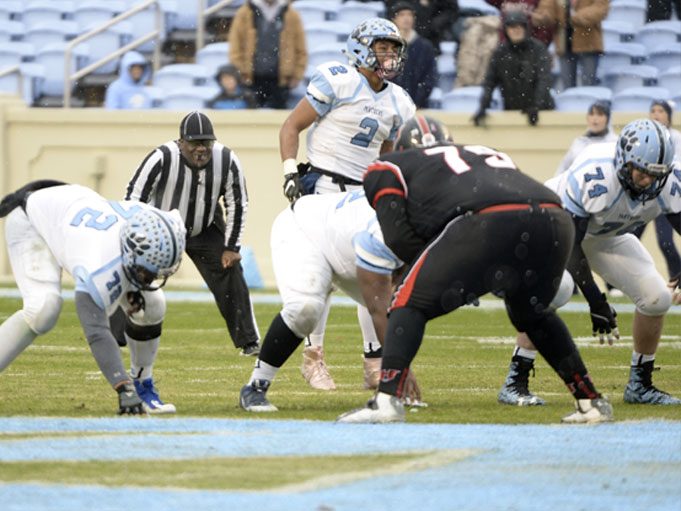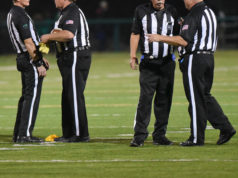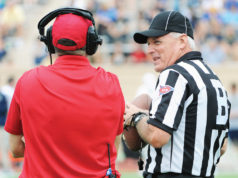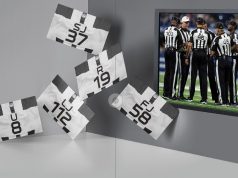An important part of officiating a solid football game is maintaining a good pace of play: neither too slow nor too fast in getting the ball spotted and marking it ready for play. Both coaches want the game to be run at a steady clip so they will know how much time they have to substitute on offense and to recognize substitutions and match-up on defense. They want to be confident that once they figure out what the referee’s and crew’s rhythm is, they’ll stick with it. Of course, in games played with a 40/25-second play clock, the ready is a non-factor, but when and how the ball is spotted still is.
Pace of play is important throughout the game regardless of the type of offense that team A runs, but it becomes even more of a factor toward the end of a close contest when team A is trying to score points. Pace will also present new challenges to officials at sub-college levels as the hurry-up, no-huddle, etc., style of ball that is so much a part of the college game today filters to those levels.
The NFHS, however, has no rules or mechanics designed to regulate up-tempo offenses. There is also no 40/25-second play clock. Thus, how individual referees and crews choose to manage the pace of play in games is hugely important in NFHS games.
My sense is that not enough attention is given to pace of play at lower levels. The first problem is referees who vary widely in how much time they let elapse from when the ball is spotted to the ready. A second problem is crews that differ markedly in how quickly or slowly they get the ball spotted after plays end. Those things force the teams to pay close attention, early on, to how that crew and referee are handling things and then adjust.
Several years before the 40/25 play clock was implemented, one coach asked me if I had a date lined up later because I was marking the ready so quickly. They didn’t substitute several times because they didn’t think they had time to do so. Another told me that my inconsistency — quick, slow, quick — was a problem for his coordinators. I also noticed most of my games had a large number of delay-of-game fouls.
So, I focused on being more deliberate and consistent. After experimenting, I decided that six seconds from ball-spot to the ready struck a happy medium. The complaints stopped, as did the multiple delay-of-game fouls.
I also spent more time in pregames stressing a sound balance between running full-tilt and walking. We moved briskly, with purpose.
You don’t hurry because team A wants to do so. If the referee has had a six-second rhythm and then starts blowing his whistle one second after the ball is spotted when team A is in hurry-up mode, he disrupts the expectations of team B and puts it at a disadvantage. Similarly, for the referee to match team A’s pace may mean that it will impair his crewmates’ ability to count players, recognize their keys, etc.
If a first down is involved, it may also mean that the linesman can’t get the chains properly re-set before the snap. Chain crews may be inexperienced or have issues that prevent them from moving with alacrity, and we need to allow them time to get set before the play gets off. The rest of the crew must also maintain the same steady rhythm it has set in getting the ball to the umpire.
In sum, it has often been said that the goal of rules and officiating mechanics should be to prevent one team from getting an unfair advantage over the other. Pace of play is a vital part of that, and to have a consistent, workable pace, both the referee and the crew as a whole must work in cruise control, neither too quickly nor too slowly, regardless of what offense team A runs. To do otherwise may not only penalize one or both teams, but may also impair the crew’s ability to work the game properly.
Also, keep in mind that perception can be more important than reality. An unsteady or overly quick or slow pace may make the game not “play well,” and your crew may be criticized by coaches, players and fans who think the crew doesn’t look like it is ready for prime time.
What's Your Call? Leave a Comment:
Note: This article is archival in nature. Rules, interpretations, mechanics, philosophies and other information may or may not be correct for the current year.
This article is the copyright of ©Referee Enterprises, Inc., and may not be republished in whole or in part online, in print or in any capacity without expressed written permission from Referee. The article is made available for educational use by individuals.


















